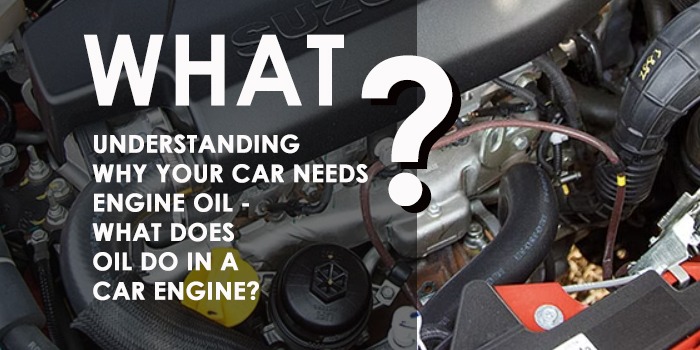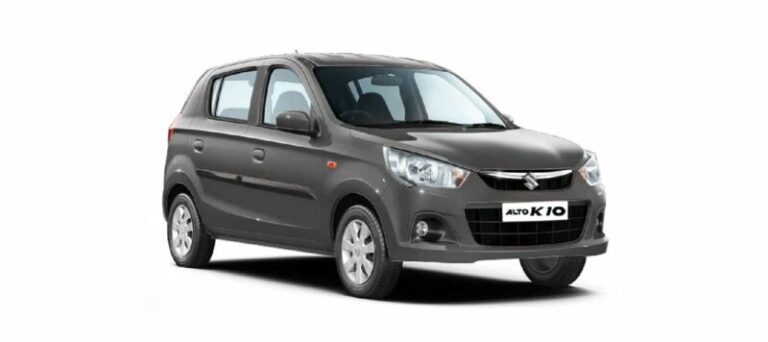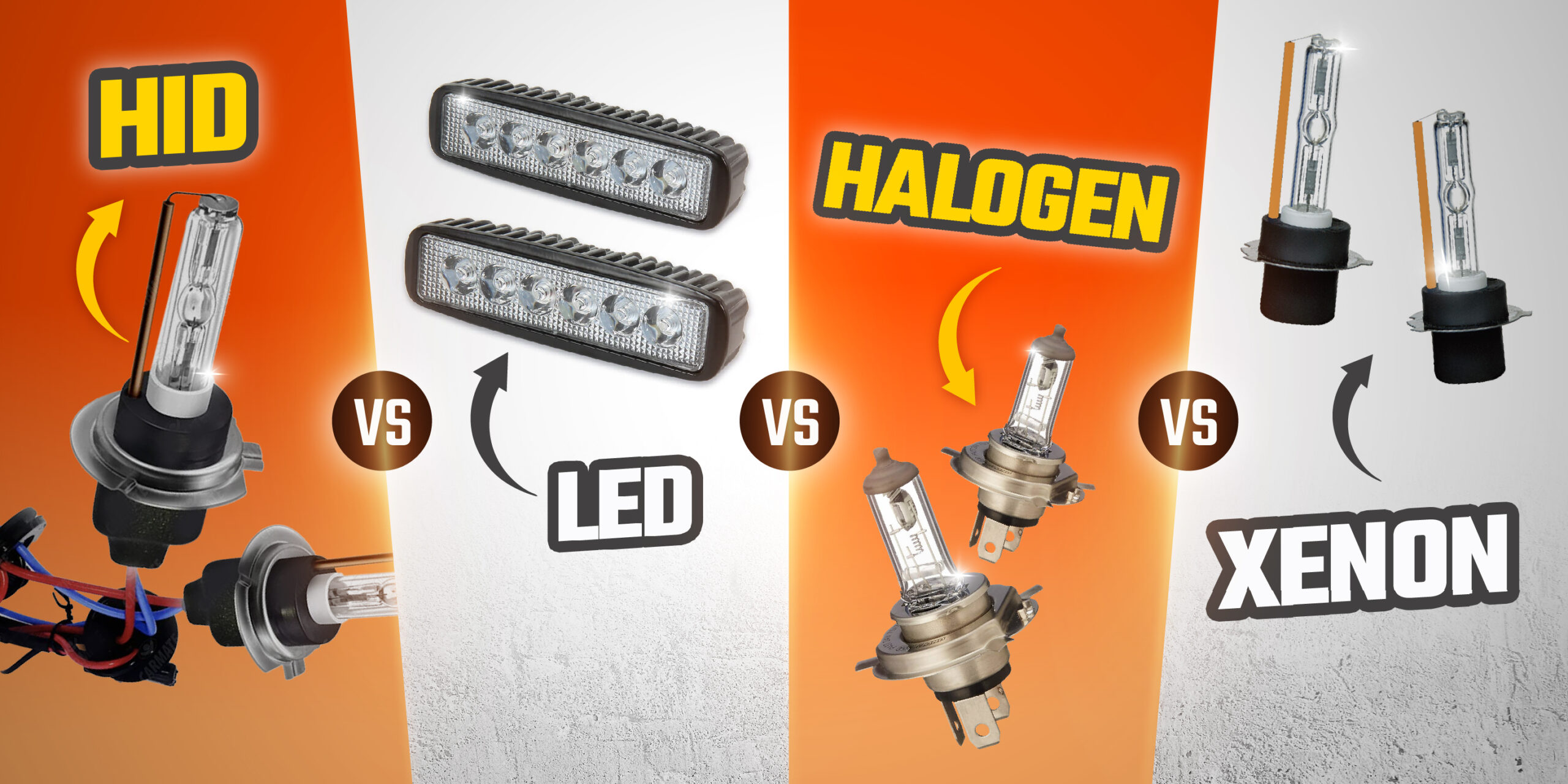
Drivers today have several options when it comes to automotive lighting, with each product offering brighter, more efficient and long-lasting illumination. This guide will take you through the most popular choices between HID Vs Led Vs Halogen Vs Xenon, and compare each headlight technology against the other. You will gain a deeper understanding of which headlight is right for different scenarios and how they stack up in terms of performance, convenience and affordability.
Understanding Headlight Technology: Which is the Best for Me?
LED or halogen headlights and what about HID bulb Vs halogen? The different kinds of headlights can be confusing for those who are unfamiliar with the types and specifications of each. Let’s take a closer look at each headlight and learn about its pros and cons.
1. Halogen
The traditional headlight bulb that has been a reliable source of automotive lighting for decades. Halogen bulbs make use of a tungsten filament that is encased in a bulb filled with halogen gas such as argon or nitrogen. High voltage is passed through the thin wire filament causing it to glow bright due to heat generation. Halogen headlight bulbs are known for their affordability & ease of replacement and are widely available and often come stock on older cars. However, their energy inefficiency and shorter lifespan make them less favoured compared to other types of headlights such as LED and HID, if an upgrade is feasible.
Advantages of Halogen bulbs:
- They are affordable & a cost-effective choice for most car owners
- It’s easy to replace halogen headlights
- Instant start-up – These headlights work as soon as you turn them on without the need to warm up
Disadvantages of Halogen bulbs:
- Less energy efficient – They lead to higher power consumption
- Shorter lifespan – halogen headlight bulb requires frequent replacement
- Heat emission – Large heat output can damage the housing and other components over time
2. LED Headlights
Light Emitting Diodes do not rely on a heating filament, instead they generate light by passing electrons through a semiconductor which causes photo emission and visible light. They excel in terms of energy efficiency, long life and sharp brightness that doesn’t fade over time. However, the higher cost may cause you to think twice about investing in LED headlights. But it is a wise decision in terms of enhanced road safety and superior illumination.
Pros of LED:
- Energy efficient – Reduced power consumption as compared to other headlight types
- Long life – Reliable lighting in all situations
- Precise beam pattern – Minimised glare for oncoming drivers and they light up the road well
Cons of LED:
- High initial cost – Car owners will have to shell out more for this advanced technology
- Complexity – May require professional installation for optimum performance
3. HID /Xenon Headlights:
High-Intensity Discharge headlights use electric arc ignition between electrodes to heat up Xenon gas inside the bulb. The resultant light created by the plasma is extremely bright and white in colour. They are more efficient compared to halogen bulbs but also more expensive. HID bulbs require additional components like regulators and starters to deal with high voltages.
Pros of HID:
- Extremely bright and intense white light for additional safety
- Long life span and energy-efficient
- Cooler operation – Reduced risk of damage to headlight housing
- Modern and stylish appearance due to white light produced
Cons of HID:
- High initial cost and requirement of additional components
- Could cause glare to oncoming drivers if fitted improperly
- Require professional installation
- Take a few seconds to warm up to reach full brightness
Here are some important tips on how to restore your headlights at home, an essential guide if you want to skip the service station bill.
Table Comparing HID Xenon Vs LED Vs Halogen
Here is a comparison of different headlight bulbs based on their specifications and features
| Headlight Type | HID (High-Intensity Discharge) Xenon | LED (Light-Emitting Diode) | Halogen |
| Light Output | Very Bright | Bright | Moderate |
| Energy Efficiency | Good | Excellent | Poor |
| Lifespan | Long-lasting | Very Long-lasting | Standard |
| Colour Temperature | Cool White (4000-6000K) | Varies (usually 5000-6000K) | Warm White (3000-4000K) |
| Startup Time | Short | Instant | Instant |
| Cost | Moderate | Higher | Low |
| Maintenance | Rarely required | Rarely required | Frequent |
| Compatibility with Projector Headlights | Yes | Yes | Yes |
| Beam Pattern | May require adjustment | Typically good | Standard |
| Environmental Impact | Contains mercury (hazardous) | Environmentally friendly | Contains halogen gas |
| Light Distribution | Even & widespread | Directional & precise | Even & widespread |
| Heat Emission | Generates heat | Minimal heat | Generates heat |
| Dimming Capability | Some models support dimming | Fully dimmable | Non-dimmable |
| Weather Resistance | Susceptible to moisture and cold | Highly resistant | Susceptible to moisture and cold |
So, Which Headlight is Best for You?
With LED and HID Xenon bulbs, you get new technology and a powerful bright headlight that is energy efficient and safe for driving. However, in terms of affordability, there is nothing as cost-effective as traditional halogen bulbs.
It also comes down to vehicle compatibility and ease of installation. You don’t want to upgrade to an expensive HID headlight assembly when you have halogen bulbs stock from the factory. If something were to go wrong with the system, it would be an expensive repair if you can’t fix the headlights at home. HID Xenon and LED lights also consume more power and may sometimes require an upgrade to the wiring system to deal with higher voltages.
Car experts recommend sticking with your stock set-up for optimum results and also to maintain road legality. However, if you use your vehicle for motorsports, off-roading, etc., then an upgrade from halogens to either LED or HID Xenons is a wise choice. If you don’t want to upgrade your headlight, you may want to consider installing a lightbar, which is a separate light unit that is fixed to the roof or bumper. These light bars provide brighter illumination and can be switched off or uninstalled when not required.
Conclusion
We hope you have a clear understanding of the headlight options available and the factors to consider when selecting the proper headlights for your vehicle. Making an informed purchase will contribute to better safety and driving comfort.
The world of automotive lighting is a dynamic one, where new technology such as adaptive headlights, matrix LED systems and laser headlights are being developed for specific purposes. Keep an eye on these developments and visit the Carorbis Blog for the latest automotive news and trends. Car and bike enthusiasts can find a plethora of articles on accessories, how-to guides, vehicle comparisons and much more.
Frequently Asked Questions
Q1. Where Halogen Lamps Are Used?
Ans. Halogen lamps find application in a number of automotive applications due to their bright and focussed beam. They are used in car headlights, and fog lights for their warm and intense light that helps cut through adverse weather conditions and improve visibility during night driving.
Q2. Is Halogen Better Than LED?
Ans. Halogen lamps are affordable but less energy efficient than LEDs. They also have a shorter lifespan. LED headlights offer brighter visibility in low-light conditions.
Q3. Are Halogen Headlights Legal?
Ans. Halogen lights are legal as long as they conform to the specific brightness levels and regulations for headlights by the RTO. Some aftermarket halogen bulbs may not be road-legal, so check if they are within limits for wattage and brightness.
Q4. Do Halogen Headlight Bulbs Dim With Age?
Ans. Halogen bulbs contain tungsten filaments which gradually wear down with use. After a while, the brightness of halogen bulbs decreases, at which point it is recommended to replace them as they are considered too dim to maintain optimum visibility.
Q5. How To Replace Halogen Headlight Bulb?
Ans. Turn off the vehicle and wait for the bulbs to cool down. Access the headlight assembly and disconnect the wiring harness. Then remove the old bulb and replace it with a new halogen bulb. Reconnect the wiring and test the headlights before closing the assembly.
Q6. Which halogen bulb is brightest?
Ans. Among common halogen bulbs, H9 is the brightest with around 65 watts for the high beam. It has a higher wattage and produces a brighter light compared to H7 or H11 halogen bulbs. Check vehicle compatibility before upgrading your headlights.
Q7. Can I Change Halogen Headlight Bulb To LED?
Ans. There are headlight conversion kits available that will change the mounting points from halogen to LED bulb holders. Some cars may require a change of wiring to deal with higher voltages and to suit the instrument cluster controls.
Q8. How Many Lumens Is A Halogen Headlight Bulb?
Ans. Lumen is the unit for brightness and is used to measure the output of a bulb. Typical halogen headlights produce around 700-1,200 lumens, but this can vary depending on specific bulb type, watts and manufacturer technology.
Q9. What’s The Brightest Halogen Headlight Bulb?
Ans. Philips range of halogen bulbs are known for their brightness, producing more output than other bulb types. Brightness can be identified by the lumen and watt rating of the halogen bulb. A higher lumen and watt rating will indicate a brighter bulb.
Q10. How Long Do Halogen Headlight Bulbs Last?
Ans. Halogen bulbs typically have a lifespan of around 500-1,000 hours of use, but factors like driving conditions, weather conditions, maintenance, etc. may reduce their life to less than a year.
Q11. How To Test Halogen Headlight Bulb?
Ans. Inspect the bulb for signs of damage, a broken filament or burnt, discoloured glass. If the bulb looks to be in good condition, test the electrical contacts with a multimeter. Check the mounting clips and fix the bulb in the headlight assembly, then see if they work when switched on.
Q12. How Often Should You Change Halogen Headlight Bulbs?
Ans. Halogen bulbs will last around 1-2 years if used properly. If you notice the headlights are dim, flickering or have reduced visibility during nighttime driving, replace the bulbs with new ones.
Q13. How Many Watts Does A Halogen Headlight Bulb Use?
Ans. Halogen bulbs come with different ratings in terms of wattage. They typically have a rating between 50 and 100 watts. Using a higher-wattage bulb than recommended could overload the electrical components of your vehicle and lead to a fuse blowing out.
Q14. Can I Use LED Bulbs In Halogen Headlights?
Ans. First check if your vehicle can support an LED bulb replacement, if it needs a conversion kit and matches with the electrical system in terms of power consumption, etc. Also LED bulbs may have a different focus pattern that may need adjustment for safe driving. Read How to Adjust a Car Headlight here.
Q15. Can You Touch A Halogen Headlight Bulb?
Ans. Halogen headlight bulbs get very hot during operation due to the tungsten filament. It is not advisable to touch a halogen bulb as it may lead to burns. Even after the bulb cools down, use a glove or clean cloth to touch the bulb as it may leave smudges on the bulb surface.
Q16. How To Check Halogen Bulb Is Good?
Ans. If the headlight is dim, provides inadequate lighting in the dark or turns off by itself, then it may be time to replace the halogen bulb.
Q17. What Are The Whitest Halogen Headlight Bulbs?
Ans. The whiteness of a halogen bulb is expressed in temperature Kelvin. A temperature of 3000-4000 K will produce a yellow light, while a 6000 – 8000 K temperature will produce a white light that gives a bright driving view and a modern, stylish appearance to your car.
Q18. What Is The Difference Between Hid And Halogen Headlights?
Ans. HID are High-Intensity Discharge bulbs that use electrodes and an electric arc within a quartz tube filled with xenon. This produces a high-intensity, extremely bright light. Halogen bulbs use a tungsten filament inside a tube filled with halogen gas, which produces a warm, yellow light which is helpful in foggy conditions.
Q19. Which Is Better Halogen Or LED Headlights?
Ans. Consider cost and brightness when choosing LED vs halogen headlights. LED lights are brighter and highly energy efficient compared to halogen headlights. LEDs also have a long lifespan due to less heat generation and advanced technology. However, LEDs are more expensive than halogen headlights but provide a more modern look to your vehicle.
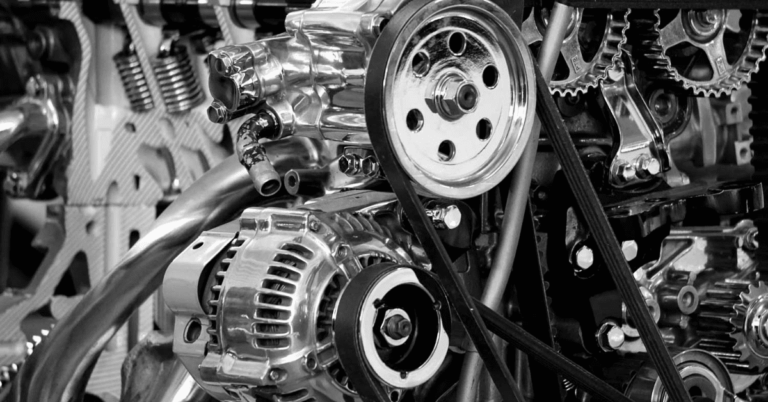
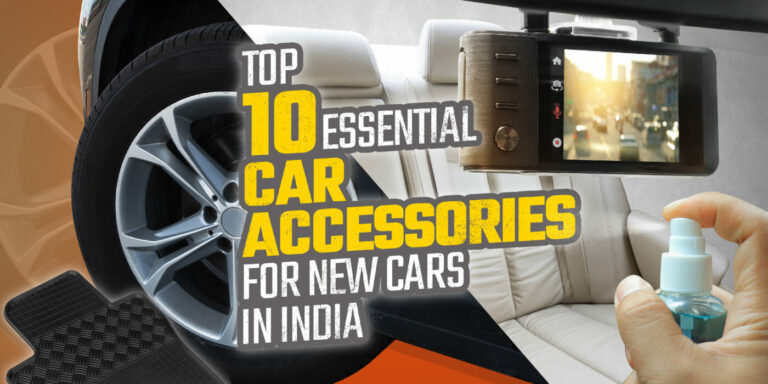
![How To Change A Flat Tire [A Detailed Guide]](https://carorbis.com/wp-content/uploads/2021/09/How-to-Change-a-Flat-Tyre-Know-About-Run-Flat-Tyres.png)

